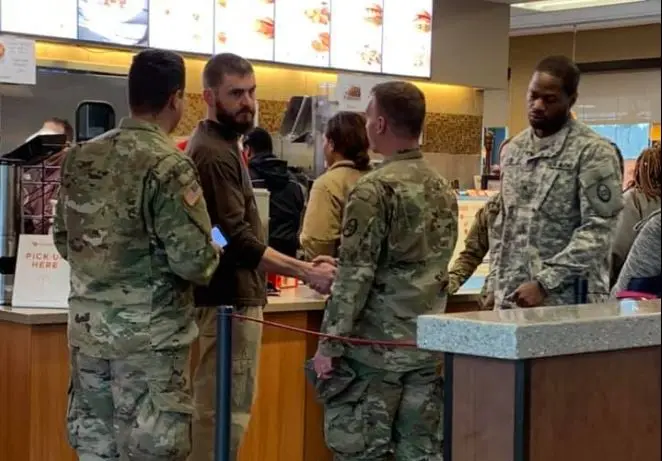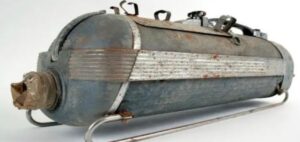It was a perfectly ordinary day. Jonathan Full and his brother Stephen were at a Chick-fil-A in Durham, North Carolina, wrangling their kids, sharing a meal, and navigating the usual happy chaos of a family lunch. But in an instant, the atmosphere of the entire restaurant shifted. The door opened, and two soldiers walked in. They were followed by nine more. Suddenly, the dining room was filled with the quiet, unmistakable presence of men and women in uniform.
This was the moment. For years, Jonathan had wanted to do something simple to show his gratitude. He’d always told himself that the next time he saw a soldier, he would buy their meal. Now, faced with eleven of them, he had his chance. As he watched the group line up, he felt a deep stir of respect and a powerful connection to a battle close to his own heart: the battle of PTSD.
He stood up, his mind made up. He approached the counter, at first planning to just cover one meal. But as he got there, a new thought rushed over him. How could he possibly stop at one? Gratitude doesn’t get portioned out. Respect isn’t a “one-per-customer” deal.
“I didn’t care if 200 more showed up,” Jonathan later said. “I was still going to buy the meal.”
And so he did. He stood at the counter and, one by one, paid for every single soldier’s meal. It wasn’t charity. It was a heartfelt “thank you” from a father who wanted his own children to see, firsthand, what it means to honor those who serve.
But the story doesn’t end there. Because Jonathan’s gesture wasn’t just a random act of kindness. It was a deeply personal mission.

The Invisible Wounds of PTSD
What Jonathan’s kids and most of the people in that restaurant didn’t know was the painful “why” behind his generosity. The Full brothers once had another brother—Joshua.
Joshua was a veteran. He had served his country, and like so many, he had returned from service carrying invisible wounds. Joshua battled severe Post-Traumatic Stress Disorder, or PTSD.
PTSD is not a sign of weakness. It is a debilitating injury. It’s a cruel consequence of trauma, where the brain’s alarm system is permanently stuck in the “on” position. For soldiers, it’s the war that follows them home. It’s the battle that continues to rage in their own minds long after the sound of gunfire has faded.
Jonathan and Stephen knew this battle all too well. They had watched their brother fight it. They knew the heavy, crushing toll that serving one’s country can take. For many veterans, the return to civilian life is the start of a new, isolating war. They struggle to find the right treatment, to reconnect with family, and to find a path to recovery.
Joshua fought hard, but the weight of that battle never truly left him. The Full family had lived, up close, with the devastating reality of what PTSD can do to a person and to a family.
Full Story: https://aquariumbee.com/man-loses-360-pounds-naturally-internet-rallies-to-support-his-next-step/

A Gift With a Deeper Purpose
So, when Jonathan stood at that counter, he wasn’t just handing over a credit card. He was paying a debt of memory. As he paid for the soldiers’ meals, he looked them in the eye, and he asked for something more than just a “thank you.”
He told them about his brother.
He asked them, as brothers and sisters in arms, to look out for each other. He asked them to reach out to anyone they knew who might be struggling. He urged them to talk about PTSD, to break the silence that so often proves fatal. He begged them to get their fellow soldiers the help they need, to not let another family lose a brother to the invisible wounds of war.
It was a simple, profound exchange. Jonathan didn’t just donate a few meals; he donated his story, his vulnerability, and his plea for action.
Stephen, his older brother, captured the moment with pride. He later shared the photos online, explaining the powerful context of the moment.
“He paid in remembrance of our late brother Joshua, who suffered mentally from severe PTSD,” Stephen wrote. “He asked them to reach out to anyone they knew with PTSD and try their best to get them the help they needed. We thanked them for their service and left. Taught our boys to take care of the people that take care of us.”
This was the lesson. It was more than a lecture from a book or a lesson in one of their school classes. This was a real-world, tangible example of turning grief into purpose. The boys didn’t just see their father buy lunch; they saw him honor their late uncle’s memory and try to save another family from the same pain.
The story, as expected, spread quickly online. It resonated not because buying lunch is so extraordinary, but because the reason was so deeply human and heartbreakingly relatable. This was a story about memory. It was about turning the sharp, ragged edges of grief into an act of generosity. It was about turning pain into a purpose.
Jonathan’s gesture was a reminder that truly honoring our soldiers means honoring their entire journey. It means caring for them not just when they are in uniform, but when they return home and are fighting battles we cannot see.
The photographs from that day show smiles and appreciation. But the legacy of that lunch is a profound reminder that PTSD is real, that it is devastating, and that our respect for those who serve must be lived, not just spoken. Jonathan set out to honor one soldier, but he ended up honoring them all—and in doing so, he gave the most beautiful and powerful tribute to his brother.



